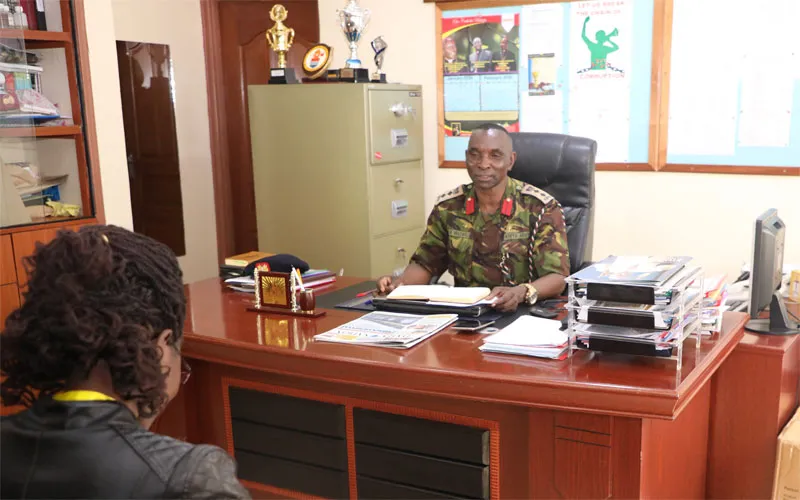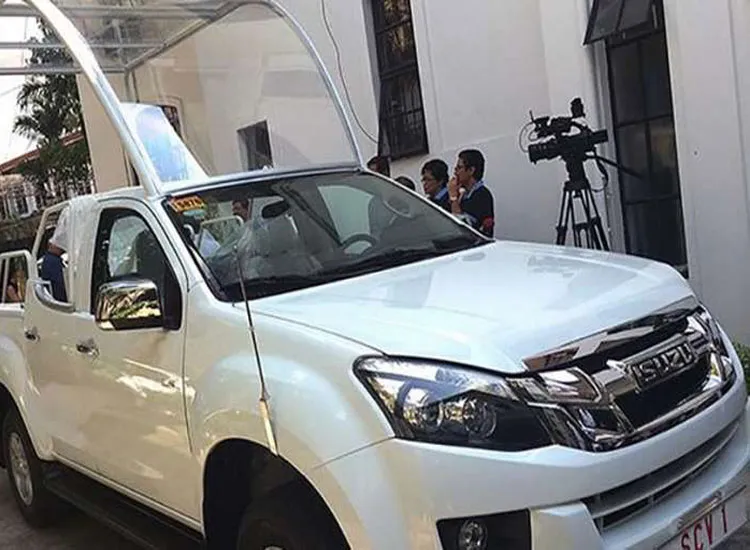He was still in Primary School when he joined the Junior Legion of Mary, an association of Catholics under the age of 18 who are devoted to works of the Church and those of Mary, the mother of Jesus.
“I had a deep devotion to Mary since childhood and I know that it is from this devotion that I find strength to sail through life’s challenges,” Msgr. Maswili says, adding that by the time he was joining Secondary School, he was already the chairman of the association’s Curia, equivalent to a parish.
He was still in high school when he met Pope John Paul II on the Pontiff’s maiden visit to Kenya in 1980.
“I saw Pope John Paul when he first visited Kenya. And I was very sad when I saw him leaving. I didn’t want him to leave,” he says.
It was also during this time that Msgr. Maswili interacted with the late Maurice Michael Cardinal Otunga who was attending the Papal Mass.
(Story continues below)
“The one thing I remember about the late Cardinal Otunga was his humility. I remember him arriving for Mass driving a simple Volkswagen car and security officers attempting to send him away. That day, the Cardinal’s humility really moved me,” he narrates.
The two would cross paths again when Maswili joined the Apostles of Jesus religious seminary in 1986 and went to Kenya’s Langata barracks for his pastoral work. The Cardinal was then in charge of the Barracks.
Following his ordination as a priest in 1993, the Apostles of Jesus cleric was posted to Aboke Parish in Lira Diocese, Uganda where he served as an assistant parish priest for two years before being confirmed as Parish Priest.
It was a short Parish Priest stint, before he was called for an interview in Kenya for a position as a Priest in the military. Msgr. Maswili terms his transition into military as something he didn’t look forward to but what he eventually developed an interest in and what has eventually become a part of his life.
“I never wanted anything to do with the military at all. In fact, I refused the position while I was still in the interview room,” the military man says, and explains, “I had become very fond of the Christians back in Uganda I never imagined leaving them to come back to Kenya."
Explaining how he was eventually roped into the military, Msgr. Maswili says, “My interviewers at KCCB (Kenya Catholic Conference of Catholic Bishops) in Westlands, Nairobi asked me why I had come all the way from Uganda when I knew that I wasn’t interested in the position I was being interviewed for. I told them I came because I obeyed. They in turn told me that I was the person they were looking for.”

As a priest, serving in the military meant that the Kenyan cleric would have to go through intensive training and physical examinations that all military men and women are subjected to, including self-discipline, hand-to-hand combat and weapons training and physical fitness.
Msgr. Maswili enrolled for this training at the Armed Forces Training College (AFTC), present-day Kenya Military Academy and in 2000, he was ready to go out on his first peace-keeping mission in Sierra Leone, which he says was one of the toughest assignments he has ever had.
“My first peacekeeping mission was in the northern parts of Sierra Leone that had been taken over by rebels. The rebels had destroyed the parish premises and everyone had fled into the bushes. The challenge was getting Christians from their hiding places in the bushes and convincing them to come back and to rebuild the Church in the midst of the terror that surrounded them,” he recollects, adding, “But by the grace of God, we were able to rebuild the Church and to convince people to start attending the Church service.”
In his first mission as a priest in the military, Msgr. Maswili found himself at the center of arguably the worst form of civil war ever that claimed at least 50,000 lives and nearly 2 million displaced before peace in the West African country was declared in January 2002.
“It was extremely difficult. Sometimes, the rebels disguised themselves as Christians and attended Mass only to gather intelligence for their groups. But we kept the faith and supported the soldiers until the country became peaceful,” he says.
The cleric who has accompanied Kenyan troops on different other peacekeeping missions in volatile areas within Africa says that the role of a priest on such a mission is to be “the face of Christ in the midst of a conflict.”

“The role of a priest in the military is often non-combatant. Though we undergo combat training, we are not supposed to carry any weapons when we go to war. Instead, we are protected by other soldiers,” he reveals and clarifies, “We are called upon to be the face of Christ in the midst of conflict.”
Military clerics and catechists, he says, provide counselling to soldiers and their families before and after a peace-keeping mission.
“We gather the families of soldiers around and walk them through accepting the possibility of their loved ones not returning from war. And after they return, we again advise them on how best to integrate the soldiers back in the families,” the military man explains.
On coming back from Sierra Leone in 2002 after the end of the civil conflict, Msgr. Maswili worked with the Kenya Navy where he built a Church building with a sitting capacity of 800 people. The church was opened in 2004 by Kenya’s immediate former President, Mwai Kibaki.
In 2010, Msgr. Maswili enrolled for a Master’s in Theology at the Catholic University of Eastern Africa (CUEA) and proceeded to enroll for a PhD in Liturgy at the same Kenya-based University that belongs to the Association of Member Episcopal Conferences in Eastern Africa (AMECEA).
In 2013, Msgr. Maswili was posted to the defense headquarters and started, two years later, building the St. Peter and Paul Cathedral with a foundation stone, which Pope Francis blessed during his maiden pastoral visit to Africa that started in Kenya. The 1,200-seater church serves the soldiers and their families as well as members of the public who stay on the fringes of the defense headquarters.

Seeking to allay the fear of the public concerning the church that is located at the heart of the defense headquarters, the military cleric says, “People fear coming to this place and think it is an enclosed facility just for soldiers. This is not true. We invite any member of the public who wishes to worship with us. The only thing they need is their ID (national identification card) and a willingness to participate in the security checks.
Today, two masses are conducted every day at the military cathedral that boasts of 26 parishes spread across different military barracks in Kenya and which are served by 24 military priests and 38 catechists. The priests help Msgr. Maswili in the administration of the parishes while he attends to his apostolic duties as a member of the Kenya Conference of Catholic Bishops (KCCB), coordination of the local church and reporting to the Holy See.
“I do everything that the Bishop does apart from ordaining priests,” he elaborates.

Highlighting his responsibilities in the Military Ordinariate, Msgr. Maswili says he leads the development of a strategic plan and also comes up with the pastoral letter of his Ecclesiastical jurisdiction.
“I basically ensure that the diocese has a proper direction and I ensure that all the groups within the diocese such as are catered for both spiritually and materially,” he says, adding that his work also entails visiting parishes within the military barracks to ensure that they are running smoothly.
Divulging on his typical day, the military cleric who stays in Nairobi’s Karen area says he begins his day quite early every day.
“My day starts at 4.30 a.m. in the morning,” he says.
“I leave the house in Karen in good time and I ensure that I am here by 5.00 a.m.,” he further says in reference to DOD where his office is situated.
He continues, “Then I say my morning prayers and arrange the altar in preparation for the 6.30 a.m. Mass. I also must say the rosary every day at 7.00 in the morning before I take my breakfast an hour later. At 8. 00 a.m., I report to the Chief of Personnel for a briefing of my day then resume my daily activities."
The day of the priest in the military ends with jogging.
“I run every day to keep fit. I also do 21 kilometers every Sunday and more than 30 kilometers once every month,” he says.
In a myriad of other hobbies, the cleric who is a trained netball coach with a stint as chairman of the netball club in the Defense Forces also enjoys playing netball and football.
According to the Kenyan military cleric, KDF chaplaincy is one of the best on the continent, only rivalled by South Africa and Nigeria.

“Not many countries in Africa have a chaplaincy to provide for the spiritual needs of the soldiers. In fact, it is only in South Africa and in Kenya that we have military ordinariates,” he says, underscoring the need for military facilities to provide for spiritual and psychosocial mechanisms for soldiers.
Msgr. Maswili says he draws his strength from the Word of God, the Eucharist and his deep devotion to Mother Mary.
“The Gospel of St. Matthew chapter 28:19-20 (which) reads in part, ‘and surely I am with you always, to the very end of the age’ has always been my source of strength,” the cleric concludes.
This story was first published by ACI Africa on 29 February 2020
Agnes Aineah is a Kenyan journalist with a background in digital and newspaper reporting. She holds a Master of Arts in Digital Journalism from the Aga Khan University, Graduate School of Media and Communications and a Bachelor's Degree in Linguistics, Media and Communications from Kenya's Moi University. Agnes currently serves as a journalist for ACI Africa.















